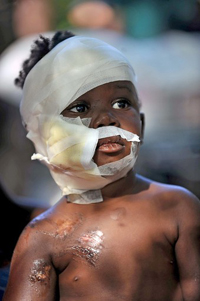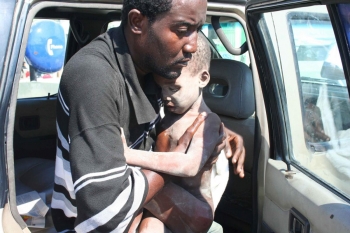“We do not rest much. Every minute is the difference between life and death.” – Darryl Hall, team leader, Rescue Task Force
By Miriam Raftery
January 23, 2010 (San Diego) –International Relief Teams (IRT) and Rescue Task Force (RTF), two San Diego-based humanitarian organizations, were among the first to reach Haiti after the earthquake struck. Both teams have saved countless lives since their arrival, though much more help is needed.
Below are stories of their heroic efforts and their eyewitness accounts of one of the worst natural disasters in the western hemisphere.
“Saving Lives—Mission One: Accomplished,” read the headline on a press release issued Friday by RTF, which succeeded in delivering urgently needed medical supplies to the U.S. embassy at Port-au-Prince. The medicines, which will be dispersed to medical personnel, were flown in by a U.S. military Black Hawk helicopter. Medications include 400 doses of calcium chloride, used to save the lives of victims who suffered crush injuries.
 RTF volunteers camped on the embassy grounds, since buildings are too unstable amidst aftershocks.
RTF volunteers camped on the embassy grounds, since buildings are too unstable amidst aftershocks.
“The entire city is running out of food,” team leader Darryl Hall reported to RTF via satellite phone. “We have yet to find an open market…We do not rest much. Every minute is the difference between life and death. We are needed and welcomed wherever we go. I have never seen so many with pain in their eyes. Will they have food tomorrow? Next week?”
RFT ran into an unexpected roadblock at San Diego’s airport, when American Airlines refused to allow the team to pay for three extra bags on a sold-out flight, journalist Chris Morrow reported at http://www.ireport.com/docs/DOC-395940. The airline strictly enforced its baggage limit, even though the RFT bags contained life-saving medications including the medicines for crush-injury victims. Yet vacationing passengers were allowed to carry on leisure equipment including surf boards, other media outlets reported. Ultimately, RTF team members repacked bags but were forced to leave some items behind.
Next, RFT aims to reach the Good Samaritan School compound, where over 2,000 people are in “desperate need” of food and other supplies. That number has swollen from the initial 150 children being cared for there by the World emergency Relief-UK.
More than 80,000 have been buried in Haiti in mass graves, though the death toll is expected to reach 200,000 and continues to climb, RTF reports. “Please keep our team in prayer,” Andrea Stone writes at RTF headquarters in Carlsbad.
Donations to RTF may be made at http://www.wer-us.org/haiti-RFT-donations.html.
IRT’s team includes medical workers as well as volunteers with construction experience to help with rebuilding. IRT raised over $600,000 to help rebuild homes in Mississippi after Hurricane Katrina and continues sending teams every other month to help Katrina survivors. To date, IRT has raised over $250,000 for Haiti relief efforts.
“They’re starting to see cases of tetanus developing, as well as meningitis and renal failure,” IRT executive director A. Barry La Forgia in San Diego told East County Magazine. “There is no running water at the hospital still, so they need to bring in water. Supplies are still in short supply, but most things can be found with looking.”
IRT team leaders report that “the people are wonderfully strong,” La Forgia added. “Given the amount of injuries and the poorest of conditions, there is very little complaining and they all seem to be very grateful for our care.”

San Diego’s IRT volunteers were involved with several high-profile cases, including treating a five-year-old boy pulled from the rubble eight days after the earthquake. (photo, left)
“Two of our team members were the first to take care of the man who jumped from a balcony in an aftershock,” La Forgia said. “He had a broken angle and a lacerated scalp. They are also starting to see some gunshot wounds,” he noted, alluding to the violence that has gripped some areas amid increasing desperation for food, water and medicines.
Nathan Watson, M.D., sent a photo of one patient he treated. “This man is -so- tough,” he wrote. “He had a wall collapse onto his back and it broke every left sided rib, 2 right ribs, collapsed a lung and separated his shoulder. And he helped me getting him into bed!” (photo, top of story)
The IRT team will return home Sunday, January 31st. Next week, IRT plans to airlift food and medical supplies to Haiti. In addition, IRT aims to ship 40,000 pounds of tents. The tents will take three weeks to reach Haiti—hopefully before the rainy season begins.
To donate to IRT, visit http://www.wer-us.org/haiti-RFT-donation.html.







Recent comments